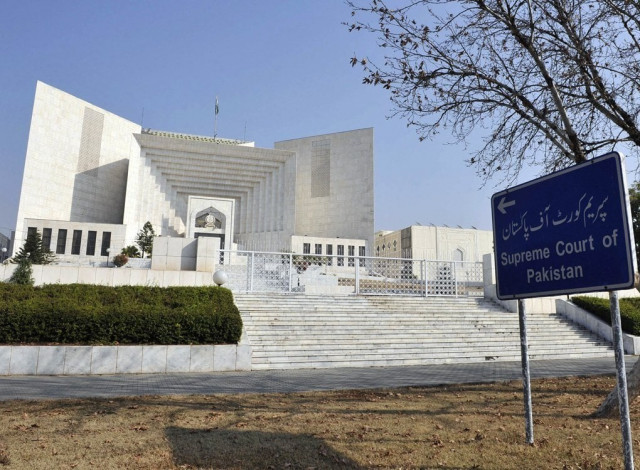Legal debate: Composition of benches gets extra importance
Govt’s demand for full court to hear Elahi’s plea shows its lack of trust in judges hearing case

The debate on the composition of benches in high-profile cases has intensified after the coalition government's demand for the formation of a full court to hear the petition against the Punjab Assembly deputy speaker’s ruling wherein 10 votes of the PML-Q for the election of the chief minister were rejected during the recount process held a day earlier.
The demand of a full court composition reflects that the coalition government lacks trust in the incumbent bench hearing the petition.
Concerns over formation of benches are being raised by Supreme Court judges as well.
During the tenure of ex-chief justice of Pakistan Gulzar Ahmed, Justice Qazi Faez Isa had raised questions on his and Justice Maqbool Baqar's exclusion from benches hearing constitutional cases.
Instead of addressing his concerns, the ex-CJP in his order had noted that Justice Isa should not hear cases related to then prime minister Imran Khan.
Interestingly, his order was also signed by three other judges. However, superior bars criticised the former CJP’s order, which was still in field.
It was also witnessed that cases of a petty nature were fixed before Justice Isa's bench during ex-CJP Gulzar's tenure.
The practice of inclusion like-minded judges is not new as the same course was adopted by ex-CJPs Iftikhar Muhammad Chaudhry and Mian Saqib Nisar.
Former CJP Asif Saeed Khosa had made it a practice that senior-most judges would hear cases which came under the preview of Article 184(3) of the Constitution.
However, his successor Gulzar gave up that practice and formed benches of 'like-minded judges' to hear sensitive political high-profile cases.
In March this year, Justice Isa had raised serious questions over the composition of a larger bench to hear the presidential reference seeking interpretation and scope of Article 63-A of the Constitution.
Read Justice Isa calls into question JCP meetings in his absence
In a three-page letter written to Chief Justice of Pakistan Umar Ata Bandial, the senior puisne judge raised eyebrows over several aspects of the structure of the bench, including the absence of senior-most judges from it and the procedural method not taken into consideration while constituting it.
He pointed out that no senior-most judge was consulted while forming the bench to hear the case on which the eyes of the entire nation were set, adding that this was troubling because it could potentially give rise to unnecessary and avoidable misgivings. “After all the adage -- justice is not only done but is also seen to be done -- has been oft-repeated by the Supreme Court,” the judge had written in the letter.
Another SC judge Justice Maqbool Baqar, who retired in May, consistently pointed out that assigning cases of sensitive nature to specific judges to the exclusion of others would have an adverse bearing on impartiality and independence of judiciary, and may tarnish its integrity in the eyes of the public.
He expressed similar views in his farewell speech.
Justice Yahya Afridi of the SC noted that to maintain judicial discipline and to uphold the rule of law, there was an inherent and dire need for judicial introspection; to structure the unfettered discretion of the CJP to constitute benches of the Supreme Court to hear and decide cases under Article 184(3), and in particular, suo motu actions, lest the exercise of such jurisdiction may be seen to have been abused.
However, CJP Bandial and Justice Munib Akhtar in their rulings had observed that it was for the chief justice -- as the “master of the roster” -- to determine the composition of a bench “and they may constitute a larger bench for hearing a review petition.
Similarly, both judges gave judicial order in support of the CJP’s discretionary power to exercise suo motu jurisdiction.
A senior lawyer says that in England, the tradition is to have a two-fold diversity -- diversity of judges and diversity of opinion.
In the US, a full court sits in every case.
"Pakistan is also a federation. We should also have a full court or at least a diverse bench for important cases,” the lawyer added.
After Justice Isa’s case, SC judges are divided on ideological lines as was reflected in their orders in high-profile cases.
The same differences were witnessed among the Judicial Commission of Pakistan (JCP) members on the elevation of judges to the apex court.
The lawyer said when judges' views on constitutional issues were an open secret, then the CJP should balance the composition of benches.
He should not give perception that only like-minded judges were being included in larger or special benches. The CJP should also end the perception that he was referring sensitive matters to his like-minded judges.
A lawyer said the coalition government's case on the Punjab Assembly deputy speaker’s ruling was weak but its demand for the composition of a full court was fair.
He added that SC full court meetings should be held continuously to regulate the CJP’s powers about the composition of benches.
No full court meeting has been held for the last two years.





1724319076-0/Untitled-design-(5)1724319076-0-208x130.webp)













COMMENTS
Comments are moderated and generally will be posted if they are on-topic and not abusive.
For more information, please see our Comments FAQ